一般疑问句及特殊疑问句总结(针对小学阶段学生)
小学英语特殊疑问句和一般疑问句地归纳

特殊疑问句和一般疑问句的答法一般疑问句通常都是 1..以be (am,is,are,)开头2.以Do,Does,Did 开头或以Can开头回答方法:前面用什么提问的就用什么答。
只有两种回答方式:1)肯定的, Yes,主语 + 提问词.2)否定的 No,主语+提问词+not.【注意:问句与答句的第一二人称要互换】如:④主语是名字时的答语:看性别,男的用he ,女的用she ,其他的用it 复数就用they。
如:①Is she……? Is he………? Is it……..?Yes, she is. Yes, he is. Yes, it is.No, she isn,t. No, he isn,t. No, it isn,t.②Are they………? Are the monkeys …….?Yes, they are. Yes, they are.No,they aren’t No,they aren’t③ Do they………? Does he……..? Did she…….?Yes,they do. Yes,he does. Yes, she did.No,they don’t. No,he doesn’t. No,she didn’t.④Are you……..? Are you……..? Do you…….?Yes, I am. Yes, we are. Yes ,I do. 或 Yes,No, I am not. No, we aren’t. No,I don’t. 或No,⑤Does Mike…….? Is ChenJi…..? Do your parents…?Yes ,he does. Yes , she is. Yes, they do.No,he doesn’t. No, she isn’t. No,they don’t.一、专项练习。
1. Did ChenJie read books yesterday?2. Can the girl cook the meals ?—————————————————————————————3.Is he going to swim this afternoon?4. Are they going to take a trip next weend? ————————————————————————————————5.Does he often go to school by bike ? 6. Do you play basketball every weekend? ———————————————————————————————————7. Did Mike do his homework yesterday? 8. Are they playing basketball now?————————————————————————————————一般疑问句及特殊疑问句的总结一般疑问句的定义:用yes或no来回答的疑问句叫一般疑问句。
小学阶段英语四会句型汇总
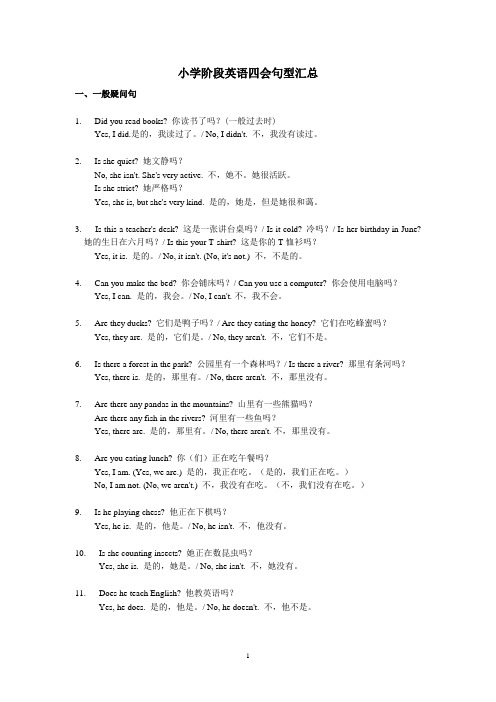
小学阶段英语四会句型汇总一、一般疑问句1. --- Did you read books? 你读书了吗?(一般过去时)--- Yes, I did.是的,我读过了。
/ No, I didn't. 不,我没有读过。
2. --- Is she quiet? 她文静吗?--- No, she isn't. She's very active. 不,她不。
她很活跃。
--- Is she strict? 她严格吗?--- Yes, she is, but she's very kind. 是的,她是,但是她很和蔼。
3. --- Is this a teacher's desk? 这是一张讲台桌吗?/ Is it cold? 冷吗?/ Is her birthday in June? 她的生日在六月吗?/ Is this your T-shirt? 这是你的T恤衫吗?--- Yes, it is. 是的。
/ No, it isn't. (No, it's not.) 不,不是的。
4. --- Can you make the bed? 你会铺床吗?/ Can you use a computer? 你会使用电脑吗?--- Yes, I can. 是的,我会。
/ No, I can't. 不,我不会。
5. --- Are they ducks? 它们是鸭子吗?/ Are they eating the honey? 它们在吃蜂蜜吗?--- Yes, they are. 是的,它们是。
/ No, they aren't. 不,它们不是。
6. --- Is there a forest in the park? 公园里有一个森林吗?/ Is there a river? 那里有条河吗?--- Yes, there is. 是的,那里有。
/ No, there aren't. 不,那里没有。
小学中常见的疑问句与反意疑问句解析
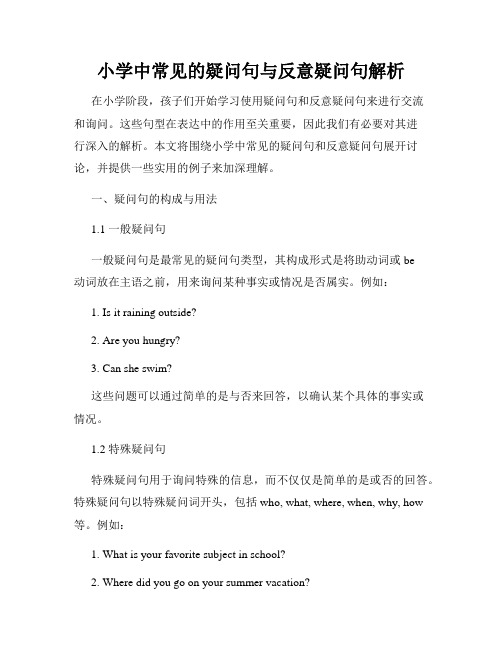
小学中常见的疑问句与反意疑问句解析在小学阶段,孩子们开始学习使用疑问句和反意疑问句来进行交流和询问。
这些句型在表达中的作用至关重要,因此我们有必要对其进行深入的解析。
本文将围绕小学中常见的疑问句和反意疑问句展开讨论,并提供一些实用的例子来加深理解。
一、疑问句的构成与用法1.1 一般疑问句一般疑问句是最常见的疑问句类型,其构成形式是将助动词或be动词放在主语之前,用来询问某种事实或情况是否属实。
例如:1. Is it raining outside?2. Are you hungry?3. Can she swim?这些问题可以通过简单的是与否来回答,以确认某个具体的事实或情况。
1.2 特殊疑问句特殊疑问句用于询问特殊的信息,而不仅仅是简单的是或否的回答。
特殊疑问句以特殊疑问词开头,包括who, what, where, when, why, how 等。
例如:1. What is your favorite subject in school?2. Where did you go on your summer vacation?3. How do you play this game?4. When is your birthday?这些问题需要提供更详细和具体的答案来回应,以满足对信息的需求。
二、反意疑问句的构成与用法反意疑问句用于在陈述句后面加上一个短疑问句,以确认陈述的内容或表达说话人的期望。
反意疑问句的构成形式是将陈述句中的动词变为否定形式,并在句尾加上与陈述句相反的短询问句。
例如:1. You don't like ice cream, do you?2. He will come to the party, won't he?3. She can swim, can't she?反意疑问句的目的是确认说话人的陈述是否正确,并期望对方给出肯定或否定的回答。
三、实例分析为了更好地理解疑问句和反意疑问句的使用方式,以下是一些常见的示例。
小学英语特殊疑问句和一般疑问句的归纳

特殊疑问句和一般疑问句的答法一般疑问句通常都是 1..以be (am,is,are,)开头2.以Do,Does,Did 开头或以Can开头回答方法:前面用什么提问的就用什么答。
只有两种回答方式:1)肯定的, Yes,主语 + 提问词.2)否定的 No,主语+提问词+not.【注意:问句与答句的第一二人称要互换】如:④主语是名字时的答语:看性别,男的用he ,女的用she ,其他的用it 复数就用they。
如:①Is she…… Is he……… Is it……..Yes, she is. Yes, he is. Yes, it is.No, she isn,t. No, he isn,t. No, it isn,t.②Are they……… Are the monkeys …….Yes, they are. Yes, they are.No,they aren’t No,they aren’t③ Do they……… Does he…….. Did she…….Yes,they do. Yes,he does. Yes, she did.No,they don’t. No,he doesn’t. No,she didn’t.④Are you…….. Are you…….. Do you…….Yes, I am. Yes, we are. Yes ,I do. 或 Yes,No, I am not. No, we aren’t. No,I don’t. 或No,⑤Does Mike……. Is ChenJi….. Do your parents…Yes ,he does. Yes , she is. Yes, they do.No,he doesn’t. No, she isn’t. No,they don’t.111v1.0 可编辑可修改一、专项练习。
1. Did ChenJie read books yesterday2. Can the girl cook the meals—————————————————————————————he going to swim this afternoon 4. Are they going to take a trip next weekend ————————————————————————————————5.Does he often go to school by bike 6. Do you play basketball every weekend ———————————————————————————————————7. Did Mike do his homework yesterday 8. Are they playing basketball now————————————————————————————————一般疑问句及特殊疑问句的总结一般疑问句的定义:用yes或no来回答的疑问句叫一般疑问句。
(完整版)小学英语四种基本句型肯定句否定句、一般疑问句与特殊疑问句
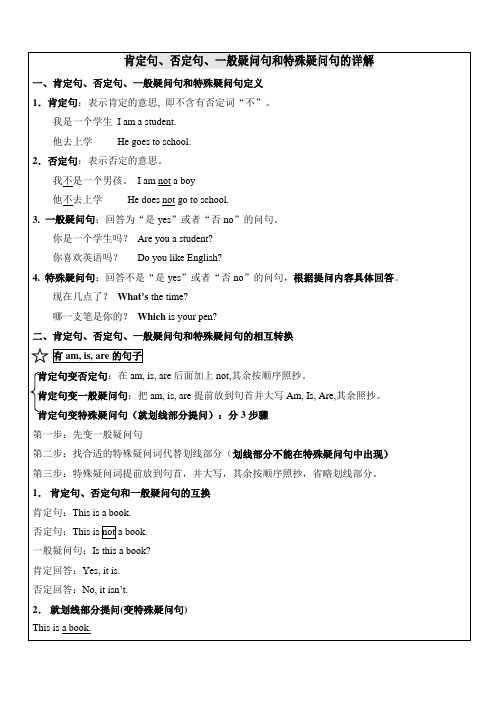
类别 陈述句
疑问句
用法
标点
肯定 叙述一件事情或
说明说话人的看法
.
否定
一般 用于提出问题
?
特殊 用于提出问题
?
选择
用于提出问题
?
反意
用于提出问题
?
例句 This is a bag. That's my book. I can see a bag over there. I don't know. Are you a student? Do you like puppets? Can you speak English? What's your name? Where's my bag? How many trees are there?
Is your friend a boy or a girl?
It's a fine day, isn't it?
祈使句 感叹句
特殊:
表示命令或请求、建议
表示惊讶\赞美\愤怒 等强烈情感
.或! !
Put it here! Look at the noticeboard.
How smart! Glad to see you! What a nice pencil case!
why 为什么 问原因 what 什么 问东西 what time 什么时间 问时间 what colour 什么颜色 问颜色 what about…怎么样 问意见 what day 星期几 问星期
三.句子的种类
how much 多少 问价钱 how about …怎么样 问意见 how far 多远 问路程 how long 多长 问时间 How soon 多快,多久 问时间 How often 多久 问频率
一般疑问句和特殊疑问句知识点总结

一般疑问句和特殊疑问句知识点总结一、一般疑问句。
1. 定义。
- 一般疑问句是用来询问某事是否属实,需要用“是(yes)”或“否(no)”来回答的疑问句。
例如:“Are you a student?”(你是一名学生吗?)2. 结构。
- be动词(am/is/are/was/were)开头的一般疑问句。
- 当句子中有be动词时,将be动词提到句首,句末加问号,句子中的主语如果是第一人称要变为第二人称。
- 肯定句:I am a teacher.(我是一名教师。
)- 一般疑问句:Are you a teacher?(你是一名教师吗?)- 其回答形式为:Yes, 主语+be动词. / No, 主语+be动词+not.- 例如:Are you from China? Yes, I am. / No, I'm not.- 助动词(do/does/did)开头的一般疑问句。
- 当句子中的谓语动词是实义动词,且句子时态为一般现在时(主语不是第三人称单数用do,主语是第三人称单数用does)或一般过去时(用did)时,将助动词提到句首,动词恢复原形,句末加问号。
- 肯定句:He likes apples.(他喜欢苹果。
)- 一般疑问句:Does he like apples?(他喜欢苹果吗?)- 肯定句:I played football yesterday.(我昨天踢足球了。
)- 一般疑问句:Did you play football yesterday?(你昨天踢足球了吗?)- 回答形式为:Yes, 主语+do/does/did. / No, 主语+don't/doesn't/didn't.- 例如:Do they go to school by bike? Yes, they do. / No, they don't.- 情态动词(can/could/may/must等)开头的一般疑问句。
(完整版)小学英语一般疑问句、否定句和特殊疑问(附习题)(可编辑修改word版)
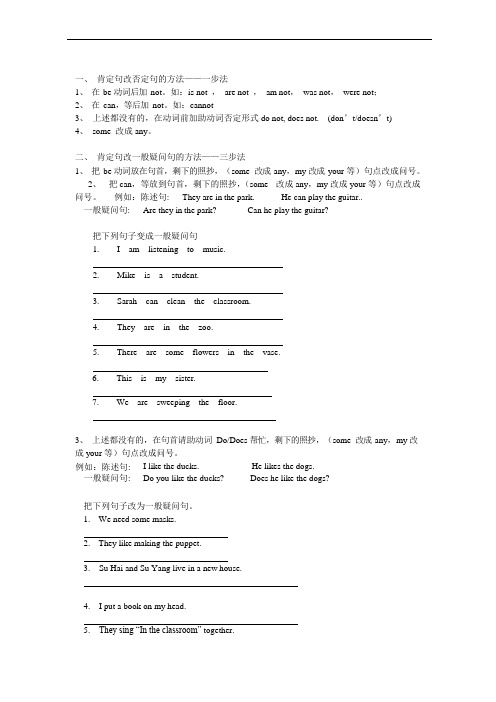
一、肯定句改否定句的方法——一步法1、在be 动词后加not。
如:is not ,are not ,am not,was not,were not;2、在can,等后加not。
如:cannot3、上述都没有的,在动词前加助动词否定形式do not, does not. (don’t/doesn’t)4、some 改成any。
二、肯定句改一般疑问句的方法——三步法1、把be 动词放在句首,剩下的照抄,(some 改成any,my 改成your 等)句点改成问号。
2、把can,等放到句首,剩下的照抄,(some 改成any,my 改成your 等)句点改成问号。
例如:陈述句: They are in the park. He can play the guitar..一般疑问句: Are they in the park? Can he play the guitar?把下列句子变成一般疑问句1. I am listening to music.2. Mike is a student.3. Sarah can clean the classroom.4. They are in the zoo.5. There are some flowers in the vase.6.This is my sister.7.We are sweeping the floor.3、上述都没有的,在句首请助动词Do/Does 帮忙,剩下的照抄,(some 改成any,my 改成your 等)句点改成问号。
例如:陈述句: I like the ducks. He likes the dogs.一般疑问句: Do you like the ducks? Does he like the dogs?把下列句子改为一般疑问句。
1.We need some masks.2.They like making the puppet.3.Su Hai and Su Yang live in a new house.4.I put a book on my head.5.They sing “In the classroom” together.6.We play basketball on Sundays.7.Tom likes listening to music三、肯定句改特殊疑问句的方法——四步法1、在一般疑问句的基础上,句首添加一个疑问词即可,可根据划线部分确定是什么疑问词。
小学英语一般疑问句和特殊疑问句精讲及练习

一、一般疑问句1、以be动词、助动词或情态动词开头;例:Is your father a teacher? Does Catherine like animals?Can Jenny speak French?2、译成汉语,都可以带上“吗”,例如上面三句可分别译为:你父亲是老师吗?凯瑟琳喜欢动物吗?3、陈述句有没有be动词(am、is、are、was、were)、助动词(do、does、did、have、had)或情态动词(can、must、will、may等),如果有,将其提到句首,句末打上问号即可。
例:It was rainy yesterday. →Was it rainy yesterday?Tom's father can play the piano. →Can Tom's father play the piano?I have got some coffee in the fridge.→Have you got any coffee in the fridge?2.如果句中没有be动词、助动词或情态动词,则加do、does、did.需要注意的是,加does或did后,原句的谓语动词要变回原形。
例:They go to school by bike. →Do they go to school by bike?Bill gets up at 6:30 every day.→Does bill get up at 6:30 every day?The students saw a film yesterday. →Did the students see a film yesterday?二、常用的特殊疑问词有:三、小学阶段,特殊疑问句句型结构有:1、特殊疑问词+助动词+主语+动词原形+其他?Where do you do study English?2、特殊疑问词+be动词+主语+其他?Why is your Mum so angry?3、特殊疑问词+情态动词+主语+动词原形+其他?What can I do for you?四、练习一、在横线上填上适当的疑问代词1、A: is the boy in blue? B:He’s Mike.2、A: pen is it? B:It’s mine.3、A: is the diary? B:It’s under the chair.4、A: balls do you have? B: 13.5、A: are the earphones? B:They are 25 yuan.6、A: is the cup? B:It’s blue.7、A: is it today? B:It’s Sunday.8、A: was it yesterday? B: It was the 13th of October.9、A: this red one? B:It’s beautiful.10、A: is your cousin? B: He’s 15 years old.11、A: do you have dinner? B: At 6 o’clock.二、把下列句子改为一般疑问句。
最新小学英语语法肯定句变一般疑问句、特殊疑问句的用法归纳总结
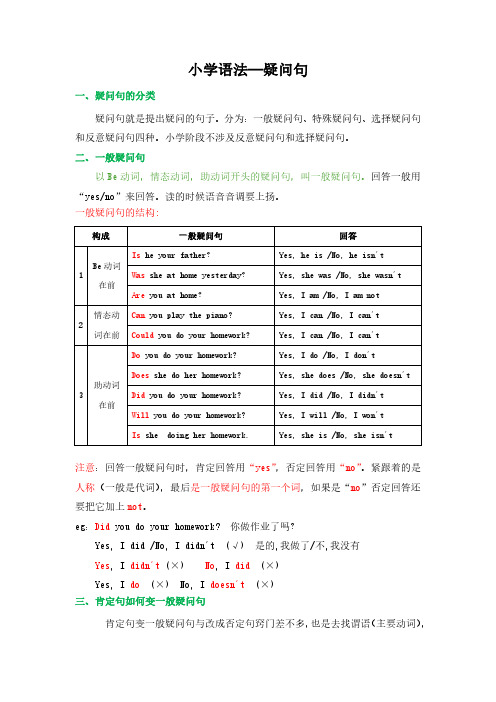
小学语法—疑问句一、疑问句的分类疑问句就是提出疑问的句子。
分为:一般疑问句、特殊疑问句、选择疑问句和反意疑问句四种。
小学阶段不涉及反意疑问句和选择疑问句。
二、一般疑问句以Be动词,情态动词,助动词开头的疑问句,叫一般疑问句。
回答一般用“yes/no”来回答。
读的时候语音音调要上扬。
一般疑问句的结构:构成一般疑问句回答1Be动词在前Is he your father?Yes,he is/No,he isn´t Was she at home yesterday?Yes,she was/No,she wasn´t Are you at home?Yes,I am/No,I am not2情态动词在前Can you play the piano?Yes,I can/No,I can´t Could you do your homework?Yes,I can/No,I can´t3助动词在前Do you do your homework?Yes,I do/No,I don´tDoes she do her homework?Yes,she does/No,she doesn´t Did you do your homework?Yes,I did/No,I didn´tWill you do your homework?Yes,I will/No,I won´tIs she doing her homework.Yes,she is/No,she isn´t注意:回答一般疑问句时,肯定回答用“yes”,否定回答用“no”。
紧跟着的是人称(一般是代词),最后是一般疑问句的第一个词,如果是“no”否定回答还要把它加上not。
eg:Did you do your homework?你做作业了吗?Yes,I did/No,I didn´t(√)是的,我做了/不,我没有Yes,I didn´t(×)No,I did(×)Yes,I do(×)No,I doesn´t(×)三、肯定句如何变一般疑问句肯定句变一般疑问句与改成否定句窍门差不多,也是去找谓语(主要动词),再变化,遇到some要变成any。
【免费】小学三年级英语语法:一般疑问句及特殊疑问句
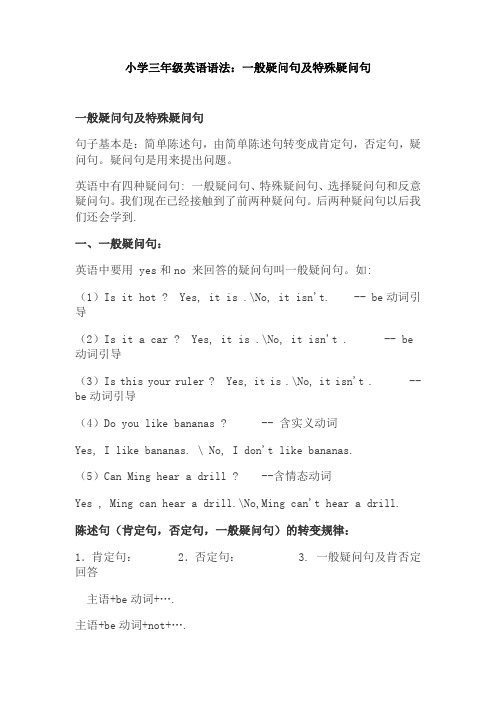
小学三年级英语语法:一般疑问句及特殊疑问句一般疑问句及特殊疑问句句子基本是:简单陈述句,由简单陈述句转变成肯定句,否定句,疑问句。
疑问句是用来提出问题。
英语中有四种疑问句: 一般疑问句、特殊疑问句、选择疑问句和反意疑问句。
我们现在已经接触到了前两种疑问句。
后两种疑问句以后我们还会学到.一、一般疑问句:英语中要用 yes和no 来回答的疑问句叫一般疑问句。
如:(1)Is it hot ? Yes, it is .\No, it isn't. -- be动词引导(2)Is it a car ? Yes, it is .\No, it isn't . -- be动词引导(3)Is this your ruler ? Yes, it is .\No, it isn't . -- be动词引导(4)Do you like bananas ? -- 含实义动词Yes, I like bananas. \ No, I don't like bananas.(5)Can Ming hear a drill ? --含情态动词Yes , Ming can hear a drill.\No,Ming can't hear a drill.陈述句(肯定句,否定句,一般疑问句)的转变规律:1.肯定句: 2.否定句: 3. 一般疑问句及肯否定回答主语+be动词+….主语+be动词+not+….be动词+主语+…?Yes, 主语+be动词./No, 主语+be动词+not.I am a teacher. I am not a teacher. Are you a teacher?--Yes, I am./ No, I am not.My mother is thin. My mother is not /isn'tthin. Is your mother thin?--Yes, she is./ No, she isn't.They are insects. They are not/aren't insects. Are they insects?--Yes. they are./ No, they aren't.主语+情态动词can+…主语+情态动词can+ not+….情态动词can+主语+…?Yes, 主语+情态动词can/No,主语+情态动词can+ notHe can jump. Hecan not/can't jump. Can he jump?--Yes,he can./ No, he can't.主语+动词+….主语+助动词do/does+not助动词do/does+主语+…. 动词原形 +….动词原形?Yes, 主语+助动词do/does.No, 主语+助动词do/does+not.He likes to eat apples. He doesn't like to eat apples. Does he like to eat apples?Yes,he does./ No,he doesn't.We like to eat apples. We don't like to eat apples. Do you like to eat apples?Yes,we do. /No,we don't.二、祈使句:表示请求、命令、建议或劝告等的句子叫祈使句,主语you常省略。
特殊疑问句和一般疑问句的用法
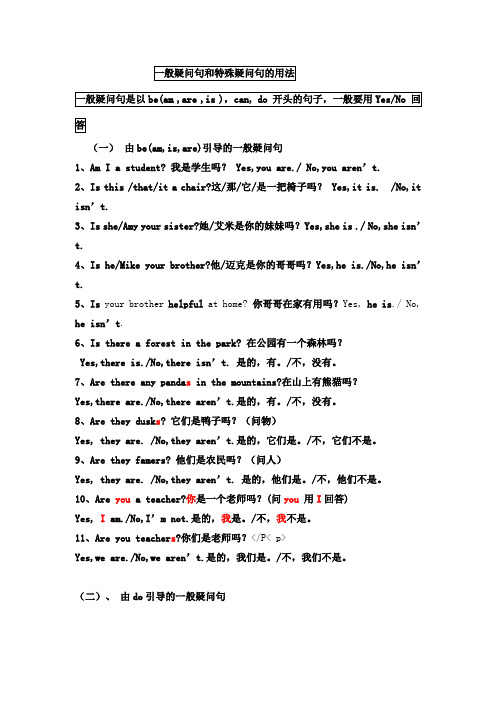
(一)由be(am,is,are)引导的一般疑问句1、Am I a student? 我是学生吗? Yes,you are./ No,you aren’t.2、Is this /that/it a chair?这/那/它/是一把椅子吗? Yes,it is. /No,it isn’t.3、Is she/Amy your sister?她/艾米是你的妹妹吗?Yes,she is ./ No,she isn’t.4、Is he/Mike your brother?他/迈克是你的哥哥吗?Yes,he is./No,he isn’t.5、Is your brother helpful at home? 你哥哥在家有用吗?Yes, he is./ No, he isn’t.6、Is there a forest in the park? 在公园有一个森林吗?Yes,there is./No,there isn’t. 是的,有。
/不,没有。
7、Are there any panda s in the mountains?在山上有熊猫吗?Yes,there are./No,there aren’t.是的,有。
/不,没有。
8、Are they dusk s? 它们是鸭子吗?(问物)Yes, they are. /No,they aren’t.是的,它们是。
/不,它们不是。
9、Are they famers? 他们是农民吗?(问人)Yes, they are. /No,they aren’t. 是的,他们是。
/不,他们不是。
10、Are you a teacher?你是一个老师吗?(问you 用I回答)Yes, I am./No,I’m not.是的,我是。
/不,我不是。
11、Are you teacher s?你们是老师吗?</P< p>Yes,we are./No,we aren’t.是的,我们是。
(完整版)小学英语四种基本句型肯定句否定句、一般疑问句与特殊疑问句
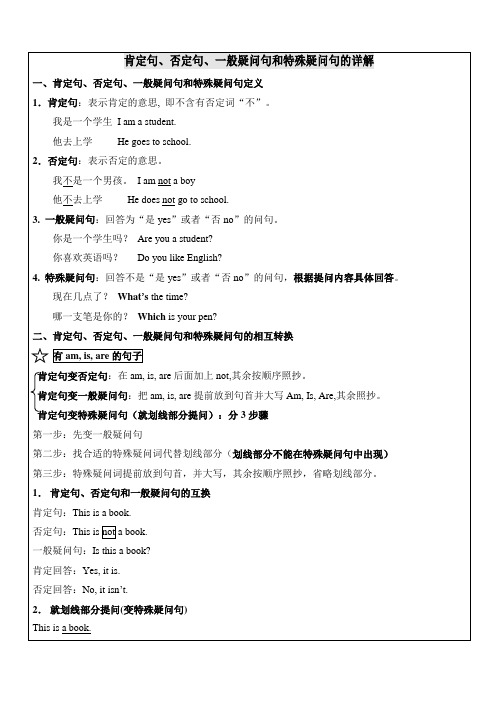
熟记变特殊疑问句时,容易判断错的情况。
1、 数词
表示年龄:He is fifty-five. How old is he ?
表示时间:It’s fifty-five. What’s the time?
表示加法:Six and two is eight. What’s six and two?
表示价格:The shirt is thirty yuan . How much is the shirt?
表示人:She’s Lucy’s sister. Who is she?
练一练 1 (用特殊疑问词填空):
1、A: _______ is the boy in blue?????????B:He’s Mike.
2、A: _______ wallet is it????????????? B:It’s mine.
表示距离:It’s five hundred metres away from here. How far is it from here?
表示长度:It’s five hundred metres. How long is it ?
4、 颜色,东西
表示颜色:The shoes are white. What color are the shoes?
第一步:变一般疑问句 Is this a book? 第二步:找合适的特殊疑问词 Is this what ? 第三步:特殊疑问词提前放到句首,并大写,其余按顺序照抄,省略划线部分。What is this?
没有 am, is, are 的句子
肯定句变否定句:在主语后面加上 do not 或者 does not,其余按顺序照抄动词用原形
2.and 变为 or
小学一般疑问句和特殊疑问句

一般疑问句及特殊疑问句疑问句分为一般疑问句(General Question)和特殊疑问句(Special Question)Part One 一般疑问句1. 一般疑问句:用be或助动词或情态动词置于句首,并以“Yes,…”,或“No,…”或相当于yes / no回答的问句称为一般疑问句.2. 含系动词be的一般疑问句的构成:1)具体地说,am 只能跟在第一人称的单数I 后面;are 搭配you, 不管是单数还是复数;is 跟在第三人称单数he, she 后面。
如:I'm in Class 2, Grade 1.→Are you in Class 2, Grade 1? 你是在一年级二班吗?(如遇第一人称,最好将其置换成第二人称)2)be 或have(有)置于句首来表达疑问,eg:Am I wrong again? (我又错了?)Yes, you are (wrong again). (是的,你又错了。
)No, you aren’t. (不,你没错。
)eg:Is it your bicycle? (这辆自行车是你的吗?)Yes, it is. (是的,是我的。
)No, it isn’t. (不,那不是我的。
)3. 含情态动词的一般疑问句的构成:情态动词提至主语前。
eg:-I can spell it. →Can you spell it? 你会拼写它吗?-Shall I call a taxi for you ? (需要我替你叫一辆出租车吗?)-Yes, please. Thank you. (好的,谢谢你。
)-No, thank you.(不必了,谢谢你。
)-Will you do that for her? (你愿意替她做那件事吗?)-Yes, I will.(是的,我愿意。
)-No, I won’t.(不,我不愿意。
)-Can she drive? (她会开车吗?)-Yes, she can.(是的,她会。
(完整版)小学英语一般疑问句、否定句和特殊疑问(附习题)

一、肯定句改否定句的方法——一步法1、在be动词后加not。
如:is not ,are not ,am not,was not,were not;2、在can,等后加not。
如:cannot3、上述都没有的,在动词前加助动词否定形式do not, does not. (don’t/doesn’t)4、some 改成any。
二、肯定句改一般疑问句的方法——三步法1、把be动词放在句首,剩下的照抄,(some 改成any,my改成your等)句点改成问号。
2、把can,等放到句首,剩下的照抄,(some 改成any,my改成your等)句点改成问号。
例如:陈述句: They are in the park. He can play the guitar..一般疑问句: Are they in the park? Can he play the guitar?把下列句子变成一般疑问句1.I am listening to music._______________________________________2.Mike is a student._______________________________________3.Sarah can clean the classroom.________________________________________4.They are in the zoo.________________________________________5. There are some flowers in the vase.________________________________________6. This is my sister._________________________________________7. We are sweeping the floor.__________________________________________3、上述都没有的,在句首请助动词Do/Does帮忙,剩下的照抄,(some 改成any,my改成your等)句点改成问号。
小学英语语法知识总结

小学英语语法知识总结英语语法是针对英语语言进行商量后,系统地总结归纳出来的一系列语言规则。
英语语法的精髓在于把握语言的使用。
那么具体该如何总结呢?下面是我为大家整理的小学英语语法学问总结6篇,希望大家能有所收获。
小学英语语法学问总结1一般过去时态(a) be 动词的过去式:I/He/she/it was(not)…. You/we/they were….一般疑问句was, were 放在句首。
(b) 动词过去式:确定句:I watched cartoons.She visited the zoo.一般疑问句:Did you read book last night? Yes, I did. No, I didn’t.Did she clean the desk just now? Yes, she did. No, she didn’t.否认句:They didn’t go the the part yesterday.He didn’t make model ships last week.动词过去式转变规则:1.一般在动词末尾加-ed,如:pull-pulled, cook-cooked2.结尾是e加d,如:taste-tasted3.末尾是辅音字母加一个元音字母和一个辅音字母的重读闭音节,应双写末尾的辅音字母,再加-ed,如:stop-stopped4.以“辅音字母+y”结尾的,变y为i,再加-ed,如:study-studied5.不规则动词过去式:am,is-was,are-were,do-did,see-saw,say-said,give-gave,get-got,go-went,come-came,have-had,eat-ate,take-took,run-ran,sing-sang,put-put,make-made,read-read,write-wrote,draw-drew,drink-drank,swim-swam,sit-sat小学英语语法学问总结2动词加ing的转变规则1.一般状况下,直接加ing,如:cook-cooking2.以不发音的e结尾,去e加ing,如:make-making, taste-tasting3.假如末尾是辅音字母加一个元音字母和一个辅音字母,双写末尾的辅音字母,再加ing,如:run-running, stop-stopping如今进行时,用来表示正在进行或发生的动作。
小学英语四种基本句型-肯定句、否定句、一般疑问句及特殊疑问句
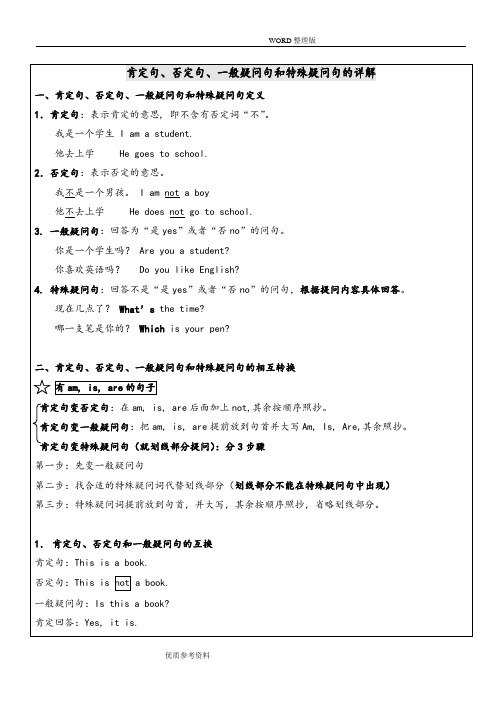
WORD 整理版
常用特殊疑问词及词组:
when 什么时间(问时间)
what date 什么日期 问具体日期
who 谁(问人)
what place 什么地点问具体地址
whose 谁的 问主人
how …怎么样 问情况
where 在哪里 问地点
how old 多大 问年龄
which 哪一个 问选择
how many 多少 问数量
I have been there already.→I haven't been there yet.
熟记变特殊疑问句时,容易判断错的情况。 1、 数词
表示年龄:He is fifty-five. How old is he ? 表示时间:It’s fifty-five. What’s the time? 表示加法:Six and two is eight. What’s six and two? 表示价格:The shirt is thirty yuan . How much is the shirt? 表示多少:I have three brothers. How many brothers do you have? 2、 姓名和人 表示人名:My name is Gina. What’s your name? 表示人:The woman is Gina. Who is the woman ? 3、 长度和距离 表示距离:It’s five hundred metres away from here. How far is it from here? 表示长度:It’s five hundred metres. How long is it ?
B: _______ ?
A: I want to make a kite.
小学英语特殊疑问句和一般疑问句的归纳

特殊疑问句和一般疑问句的答法一般疑问句通常都是1..以be (am,is,are,)开头2.以Do,Does,Did 开头或以Can开头回答方法:前面用什么提问的就用什么答。
只有两种回答方式:1)肯定的,Yes,主语+ 提问词.2)否定的No,主语+提问词+not.【注意:问句与答句的第一二人称要互换】如:④主语是名字时的答语:看性别,男的用he ,女的用she ,其他的用it 复数就用they。
如:①Is she……? Is he………? Is it……..?Yes, she is.Yes, he is. Yes, it is.No, she isn,t. No, he isn,t. No, it isn,t.②Are they………? Are the monkeys …….?Yes, they are.Yes, they are.No,they aren’t No,they aren’t③Do they………?Does he……..? Did she…….?Yes,they do. Yes,he does. Yes, she did.No,they don’t. No,he doesn’t. No,she didn’t.④Are you……..?Are you……..? Do you…….?Yes, I am.Yes, we are. Yes ,I do. 或Yes,No, I am not. No, we aren’t. No,I don’t. 或No,⑤Does Mike…….? Is ChenJi…..? Do your parents…?Yes ,he does.Yes , she is. Yes, they do.No,he doesn’t. No, she isn’t. No,they don’t.一、专项练习。
1. Did ChenJie read books yesterday?2. Can the girl cook the meals ? —————————————————————————————3.Is he going to swim this afternoon?4. Are they going to take a trip next weend? ————————————————————————————————5.Does he often go to school by bike ? 6. Do you play basketball every weekend? ———————————————————————————————————7. Did Mike do his homework yesterday? 8. Are they playing basketball now? ————————————————————————————————一般疑问句及特殊疑问句的总结一般疑问句的定义:用yes或no来回答的疑问句叫一般疑问句。
一般疑问句及特殊疑问句总结(针对小学阶段学生)
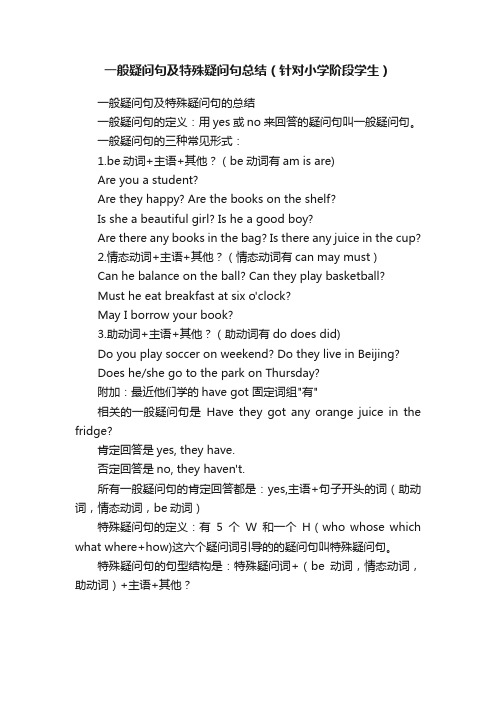
一般疑问句及特殊疑问句总结(针对小学阶段学生)一般疑问句及特殊疑问句的总结一般疑问句的定义:用yes或no来回答的疑问句叫一般疑问句。
一般疑问句的三种常见形式:1.be动词+主语+其他?(be动词有am is are)Are you a student?Are they happy? Are the books on the shelf?Is she a beautiful girl? Is he a good boy?Are there any books in the bag? Is there any juice in the cup?2.情态动词+主语+其他?(情态动词有can may must )Can he balance on the ball? Can they play basketball?Must he eat breakfast at six o'clock?May I borrow your book?3.助动词+主语+其他?(助动词有do does did)Do you play soccer on weekend? Do they live in Beijing?Does he/she go to the park on Thursday?附加:最近他们学的have got 固定词组"有"相关的一般疑问句是Have they got any orange juice in the fridge?肯定回答是yes, they have.否定回答是no, they haven't.所有一般疑问句的肯定回答都是:yes,主语+句子开头的词(助动词,情态动词,be动词)特殊疑问句的定义:有5个W和一个H(who whose which what where+how)这六个疑问词引导的的疑问句叫特殊疑问句。
特殊疑问句的句型结构是:特殊疑问词+(be动词,情态动词,助动词)+主语+其他?。
- 1、下载文档前请自行甄别文档内容的完整性,平台不提供额外的编辑、内容补充、找答案等附加服务。
- 2、"仅部分预览"的文档,不可在线预览部分如存在完整性等问题,可反馈申请退款(可完整预览的文档不适用该条件!)。
- 3、如文档侵犯您的权益,请联系客服反馈,我们会尽快为您处理(人工客服工作时间:9:00-18:30)。
一般疑问句及特殊疑问句的总结
一般疑问句的定义:用yes或no来回答的疑问句叫一般疑问句。
一般疑问句的三种常见形式:
1.be动词+主语+其他?(be动词有am is are)
Are you a student?
Are they happy? Are the books on the shelf?
Is she a beautiful girl? Is he a good boy?
Are there any books in the bag? Is there any juice in the cup?
2.情态动词+主语+其他?(情态动词有can may must )
Can he balance on the ball? Can they play basketball?
Must he eat breakfast at six o'clock?
May I borrow your book?
3.助动词+主语+其他?(助动词有do does did)
Do you play soccer on weekend? Do they live in Beijing?
Does he/she go to the park on Thursday?
附加:最近他们学的have got 固定词组"有"
相关的一般疑问句是Have they got any orange juice in the fridge?
肯定回答是yes, they have.
否定回答是no, they haven't.
所有一般疑问句的肯定回答都是:yes,主语+句子开头的词(助动词,情态动词,be动词)
特殊疑问句的定义:有5个W和一个H(who whose which what where+how)这六个疑问词引导的的疑问句叫特殊疑问句。
特殊疑问句的句型结构是:特殊疑问词+(be动词,情态动词,助动词)+主语+其他?。
